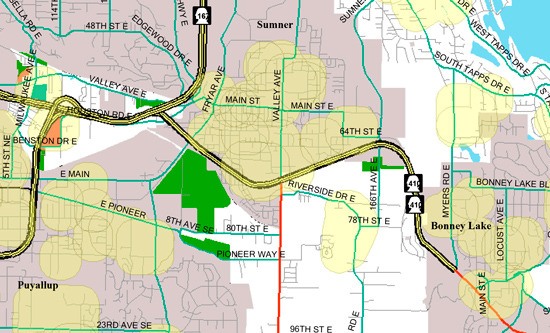The Pierce County Council is putting a question concerning marijuana before the voters during the April 26 special election: Should the production, processing and sale of marijuana be allowed in unincorporated Pierce County?
This nonbinding advisory vote is meant to inform the council on the public’s opinion of Ordinance 2015-27s, which will lift the current ban on marijuana businesses in unincorporated parts of the county July 1.
The ordinance was passed 4-3 on Dec. 15, 2015, by council members Connie Ladenburg, Rick Talbert, Douglas Richardson and Derek Young. Council members Dan Roach, Joyce McDonald and Jim McCune voted against the ordinance. The ordinance requested the advisory vote be put on the April 26 ballot.
The advisory vote will only be on the ballots of county residents who live in unincorporated areas, as the ordinance will not affect marijuana bans in cities.
County ban: July 2012 – July 2016
After Washington voters legalized marijuana in the state by passing Initiative 502 Nov. 6, 2012, the Pierce County Council passed Ordinance 2013-26 on July 7, 2013, which added new language to the Pierce County Code surrounding marijuana.
The ordinance prohibited the production, processing and retailing of marijuana in all county zones until the Liquor Control Board (now known as the Liquor and Cannabis Board) issued permanent regulations governing the use of marijuana licenses and until the county adopts zoning regulations for marijuana businesses in unincorporated areas.
The land-use regulations in Ordinance 2013-26 were set to expire in January 2014, meaning the county would defer to the LCB’s marijuana land-use regulations if another land-use ordinance was not passed.
Instead of allowing the ordinance to expire, the council passed Ordinance 2013-111s on Nov. 6, 2013. This ordinance stated no marijuana businesses shall be approved by the county until marijuana was no longer a Schedule 1 substance as defined by federal law.
The ban was vetoed by County Executive Pat McCarthy Nov. 22, but the council overrode the veto Dec. 10, 2013.
The ban will remain in place until July 1, when Ordinance 2015-27s will take effect, or until another ordinance relating to marijuana is passed.
While Ordinance 2015-27s will allow marijuana producers, processors and retailers to open and operate in most county zones, marijuana businesses are still not allowed to operate in rural zones, except for the rural zones in the Key Peninsula and Gig Harbor Peninsula Community Plan areas.
State of marijuana: County and state
According to the Liquor and Cannabis Board, there are close to 200 pending marijuana business applications in Pierce County. Passing Ordinance 2015-27s could open the door to allow many of these businesses to receive their licenses.
There are approximately 90 marijuana production licenses in the works; 18 licenses are active and 71 are pending. One business is closed.
Of 72 total processing licenses, 21 are currently active and 50 are pending. One processor closed.
There is no limit to how many marijuana producers and processors can apply to set up in a specific area. Their only requirements are to adhere to the zoning laws of the area they’ve applied to (producers are limited to employment center and community employment zones in Pierce County, and processors are limited to the employment center, community employment and mixed use district zones).
There are already 31 active retail licenses in the county and 150 are pending. Seventeen retail businesses have closed. Retail stores are limited to operating in mixed-use districts, commercial mixed-use districts and community center zones, as well as the rural activity center zones in the Key Peninsula and Gig Harbor Peninsula Community plan areas.
Of those 150 pending licenses, 17 are licensed to operate in unincorporated Pierce County. The rest have applied to operate in a city with a current marijuana ban, which will not be affected by Ordinance 2015-27s.
Marijuana businesses made close to $260 million in marijuana retail sales in 2015. The state received almost $65 million in excise tax revenue that year.
Marijuana retail stores more than doubled last year’s sales with close to $534 million in 2016. The state has already collected more than $126 million in excise taxes.
Because of Pierce County’s current ban on marijuana, it has not received any money from the state for marijuana enforcement. These funds were used as an incentive for counties and cities to allow marijuana businesses to open, said Liquor and Cannabis Board spokesman Brian Smith.
King County received more than $965,000 for marijuana enforcement this year.
Buckley, the first city on the Plateau to allow marijuana retailers to set up shop, received more than $100,000 for marijuana enforcement this year – enough to add a full-time police officer to the city’s police force.
In total, $6 million was given to counties and cities for marijuana enforcement this year.


